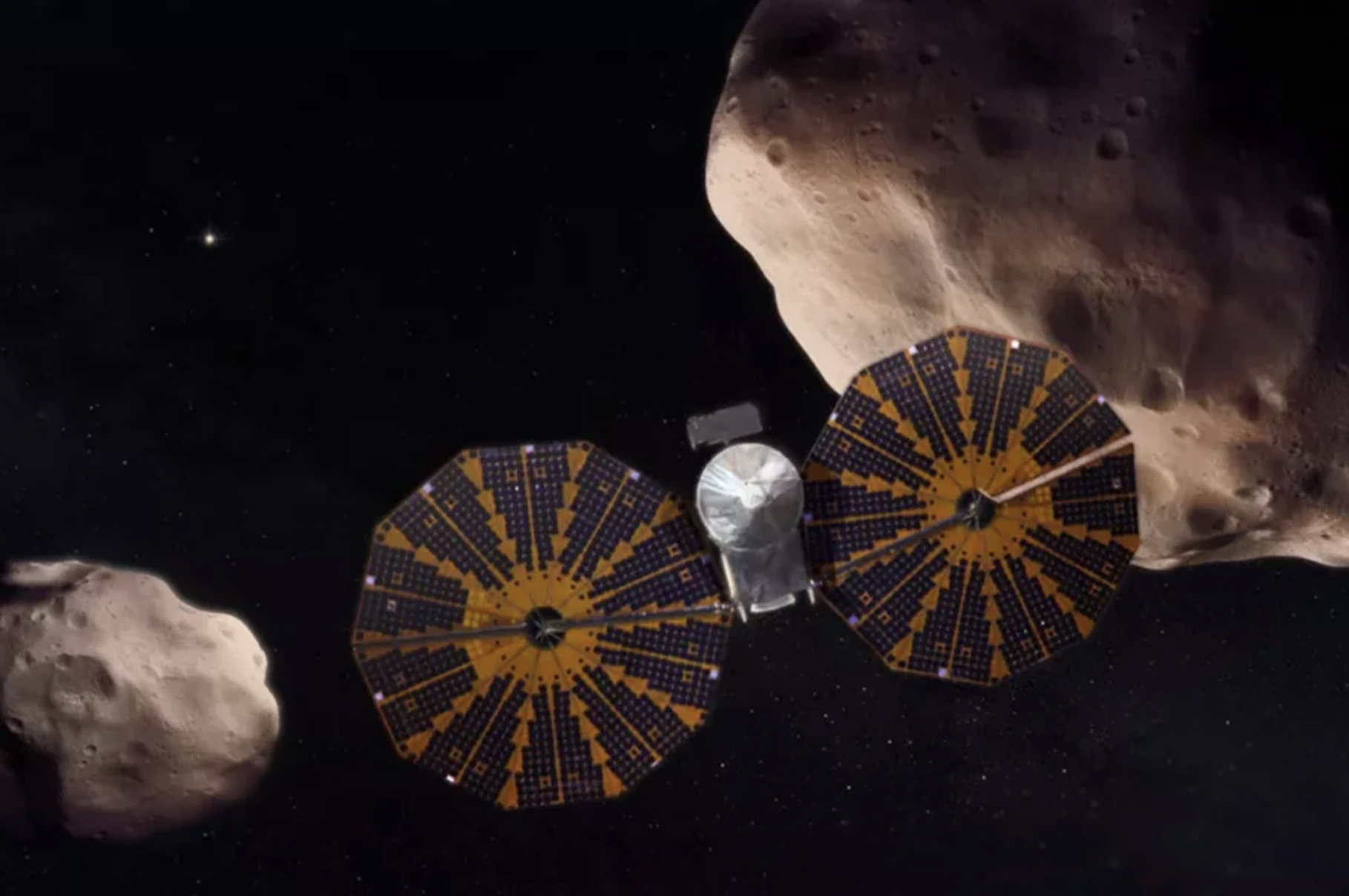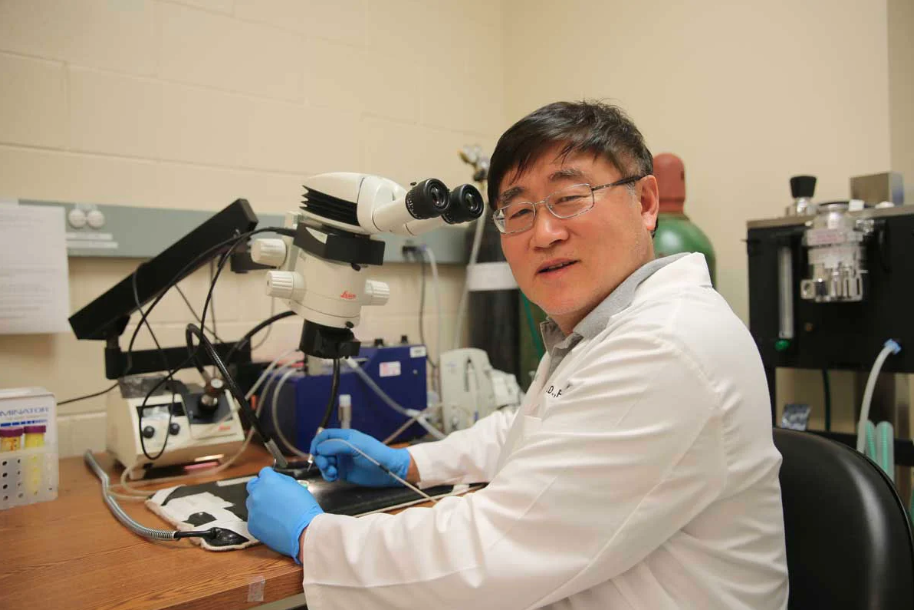Research
The University of Central Florida brings innovation and solutions to some of society’s most pressing problems through research and the discovery and dissemination of new knowledge and avenues for progress.
Tue May 30
University of Central Florida Coastal researchers are part of a new, $2 million U.S. National Science Foundation-funded project to work toward a more inclusive field of marine sciences. The Coastal and Estuarine Research Federation (CERF), an estuary research nonprofit, is leading the project, which includes six partner agencies and universities, including UCF. The collaboration is…
Wed May 24
University of Central Florida researcher is part of a team that recently discovered significant insights into the size and surface composition of Dinkinesh, an asteroid that NASA’s Lucy mission will visit in November. Using observations from telescopes in Spain and the U.S., the team found that Dinkinesh is remarkably small, making it the smallest asteroid…
Tue May 16
Whether it’s solving the world’s biggest problems or investigating the potential of novel discoveries, researchers at UCF are on the edge scientific breakthroughs that aim to make an impact. Through the Research in 60 Seconds series, student and faculty researchers condense their complex studies into bite-sized summaries so you can know how and why Knights plan…
Thu May 11
University of Central Florida engineering researcher is part of an international team of scientists who are developing oyster-based shoreline protection for U.S. coastlines. The work is through a $12.6 million Defense Advanced Research Projects Agency (DARPA)-funded project that seeks to create self-repairing, biological and human-engineered reef-mimicking structures. The project is led by Rutgers University and…
Tue May 9
University of Central Florida College of Medicine researcher has developed a new, more precise treatment for a major cause of illness around the world each year — acute respiratory viral infections. Acute respiratory viral infections include sicknesses such as the flu, pneumonia, respiratory syncytial virus (RSV) and coronavirus. These infections cause millions of illnesses worldwide, with the…
Wed May 3
Bacteria naturally adapt to various environmental stimuli and as they mutate, these changes can make them resistant to drugs that would kill or slow their growth. In a recent article published in PLoS Genetics, UCF College of Medicine microbiologist Salvador Almagro-Moreno uncovers the evolutionary origins of antimicrobial resistance (AMR) in bacteria. His studies on the bacterium that causes cholera, Vibrio cholerae, provide insight into deciphering what conditions must occur for…
Tue Apr 25
University of Central Florida researcher is leading a nearly $5 million U.S. National Science Foundation-funded project to develop the first, large-scale system for extended reality human subjects research. Called the Virtual Experience Research Accelerator, or VERA, the system will enable researchers to carry out large studies in extended reality (XR) environments, including virtual reality (VR),…
Tue Apr 18
team of UCF College of Medicine researchers has created a digital topographical map of the cardiac sympathetic neural network, the region that controls the body’s heart rate and its “fight-or-flight” response. They hope this map will eventually serve as a guide to treat cardiovascular conditions using bioelectronic devices. The study, led by Zixi Jack Cheng,…
Wed Apr 12
University of Central Florida researcher will be using the newly constructed Two-meter Twin Telescope (TTT) in the Canary Islands, Spain, to study metal-rich M-type asteroids. The work can inform the study of asteroids like 16 Psyche, an M-type, or metal, asteroid NASA is launching a mission in October 2023 to visit. The M-type asteroids offer…
Mon Apr 10
When children break a bone, the traditional process of inserting metal implants, only to remove them once the bone is healed, can be difficult, stressful and even harmful to their still-growing bodies. UCF biomedical engineer Mehdi Razavi believes there is a better way to heal bone damage. By using bioabsorbable magnesium composites, Razavi’s team is…
Thu Mar 30
Falls — and the fear of falling — are the leading cause of injury, disability and hospitalization among racially diverse, low-income older adults, according to the U.S. Centers for Disease Control and Prevention. To help address this critical issue and reduce disparities, a team of University of Central Florida researchers is partnering with the City…
Thu Mar 30
University of Central Florida professor and 26 other researchers have published a study identifying the challenges humans must overcome to ensure that artificial intelligence is reliable, safe, trustworthy and compatible with human values. The study, “Six Human-Centered Artificial Intelligence Grand Challenges,” was published in the International Journal of Human-Computer Interaction. Ozlem Garibay ’01MS ’08PhD, an assistant professor…
Thu Mar 30
UCF students will share their findings with the university community during Student Research Week, March 27-31. Compiling and condensing all their work on one poster each, students will present their work in Pegasus Ballroom and enlighten others about their unique areas of expertise. Within five poster sessions, more than 500 students from all colleges will present their projects…
Mon Mar 27
Cardiovascular disease, which includes heart attacks and stroke, is the leading cause of death in the U.S. But it doesn’t have to be. According to the Centers for Disease Control (CDC), an estimated 80% of cardiovascular disease is preventable. However, there is not a one-size-fits-all approach to prevention. According to the CDC, healthcare disparities, including…
Mon Mar 27
UCF is one of 16 universities in the U.S. that have formed a consortium on nuclear forensics. The association is supported by a $25 million cooperative agreement with the Department of Energy’s National Nuclear Security Administration (NNSA). The goal of the consortium is to engage in research that supports the NNSA’s nuclear security and nonproliferation…
Mon Mar 27
Whether it’s solving the world’s biggest problems or investigating the potential of novel discoveries, researchers at UCF are on the edge scientific breakthroughs that aim to make an impact. Through the Research in 60 Seconds series, student and faculty researchers condense their complex studies into bite-sized summaries so you can know how and why Knights plan…
Thu Mar 16
potential treatment for Florida’s devastating red tides took another step toward widespread deployment after successful testing in Sarasota Bay. Additional detailed data analysis is required to confirm results, but UCF Assistant Professor of Biology Kristy Lewis is encouraged by the large-scale test of a red tide mitigation technology called clay flocculation that was performed in partnership with…
Thu Mar 16
University of Central Florida researcher Debashis Chanda, a professor in UCF’s NanoScience Technology Center, has drawn inspiration from butterflies to create the first environmentally friendly, large-scale and multicolor alternative to pigment-based colorants, which can contribute to energy-saving efforts and help reduce global warming. The development was published today in Science Advances as a featured article. “The range of…
Thu Mar 16
Imagine being able to take your commute from the highways to the skies by hailing your own flying taxi. It’s a possibility that could become reality as researchers and stakeholders invest in transformative airborne technologies known as advanced air mobility (AAM). This technology includes the concept of aerial ridesharing, and is defined as the local, on-demand…
Mon Mar 6
The requests come regularly to the research teams at UCF’s Institute of Simulation and Training (IST). The change leader of a company or with a government agency wants to know how they can take a gigantic innovative leap without also taking a gigantic risk. Is it even possible? And so, these leaders reach out to IST, where the following…



















